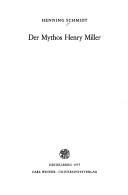| Listing 1 - 10 of 13 | << page >> |
Sort by
|
Book
ISBN: 9781623561086 Year: 2013 Publisher: New York Bloomsbury Academic
Abstract | Keywords | Export | Availability | Bookmark
 Loading...
Loading...Choose an application
- Reference Manager
- EndNote
- RefWorks (Direct export to RefWorks)
Miller, Henry, --- Philosophy. --- Miller, Henry --- Miller, Henry Valentine --- Flapdoodle, Phineas --- ミラー, ヘンリー --- Miller, Genri --- Миллер, Генри --- Miller, Henri --- ヘンリー・ミラー,
Book
ISBN: 0571150365 Year: 1988 Publisher: London Faber and Faber
Abstract | Keywords | Export | Availability | Bookmark
 Loading...
Loading...Choose an application
- Reference Manager
- EndNote
- RefWorks (Direct export to RefWorks)
Miller, Henry --- Durrell, Lawrence --- Authors, American --- Authors, English --- Miller, Henry, --- Miller, Henry Valentine --- Durrell, Lawrence George --- Flapdoodle, Phineas --- ミラー, ヘンリー --- Miller, Genri --- Миллер, Генри --- Miller, Henri --- ヘンリー・ミラー,
Book
ISBN: 9782283025291 228302529X Year: 2012 Publisher: Paris Buchet Chastel
Abstract | Keywords | Export | Availability | Bookmark
 Loading...
Loading...Choose an application
- Reference Manager
- EndNote
- RefWorks (Direct export to RefWorks)
Authors, American --- Miller, Henry, --- Nadeau, Maurice --- Nadeau, M. --- Miller, Henry --- Miller, Henry Valentine --- Flapdoodle, Phineas --- ミラー, ヘンリー --- Miller, Genri --- Миллер, Генри --- Miller, Henri --- ヘンリー・ミラー,

ISBN: 0859691667 9780859691666 Year: 1979 Publisher: London Sheldon Press
Abstract | Keywords | Export | Availability | Bookmark
 Loading...
Loading...Choose an application
- Reference Manager
- EndNote
- RefWorks (Direct export to RefWorks)
Miller, Henry --- Criticism and interpretation --- Authors, American --- Miller, Henry, --- Miller, Henry Valentine --- Flapdoodle, Phineas --- ミラー, ヘンリー --- Miller, Genri --- Миллер, Генри --- Miller, Henri --- ヘンリー・ミラー,

ISBN: 3533026019 3533026027 9783533026013 Year: 1977 Volume: 118 Publisher: Heidelberg: Winter,
Abstract | Keywords | Export | Availability | Bookmark
 Loading...
Loading...Choose an application
- Reference Manager
- EndNote
- RefWorks (Direct export to RefWorks)
Authors, American --- Biography --- Miller, Henry, --- Biography. --- Miller, Henry --- Miller, Henry Valentine --- Flapdoodle, Phineas --- ミラー, ヘンリー --- Miller, Genri --- Миллер, Генри --- Miller, Henri --- ヘンリー・ミラー, --- Authors, American - 20th century - Biography --- Miller, Henry, - 1891-1980
Book
ISBN: 0748651985 1283100428 9786613100429 0748645462 9780748645466 9781283100427 9780748687671 074868767X 9780748641185 0748641181 Year: 2011 Publisher: Edinburgh : Edinburgh University Press,
Abstract | Keywords | Export | Availability | Bookmark
 Loading...
Loading...Choose an application
- Reference Manager
- EndNote
- RefWorks (Direct export to RefWorks)
Brings Henry Miller back to the critical attention that his work deserves as well as making an original contribution to literary discussion on intertextuality.
Intertextuality. --- Criticism --- Semiotics --- Influence (Literary, artistic, etc.) --- Miller, Henry, --- Miller, Henry Valentine --- Criticism and interpretation. --- Flapdoodle, Phineas --- ミラー, ヘンリー --- Flapdoodle, Phineas, --- Miller, Genri, --- Миллер, Генри, --- Miller, Henri, --- ヘンリー・ミラー, --- Miller, Genri --- Миллер, Генри --- Miller, Henri
Book
ISBN: 1472543629 1623562082 9781623562083 9781623561086 9781472543622 1623561086 9781623561086 9781623569006 1623569001 1628928069 Year: 2013 Publisher: New York Bloomsbury
Abstract | Keywords | Export | Availability | Bookmark
 Loading...
Loading...Choose an application
- Reference Manager
- EndNote
- RefWorks (Direct export to RefWorks)
"Against skeptics, Männiste argues that Miller does indeed have a philosophy of his own, which underpins most of his texts. It is demonstrated that this philosophy, as a metaphysical sense of life, forms a system the understanding of which is necessary to adequately explain even some of the most basic of Miller's ideas. Building upon his notion of the inhuman artist, Miller's philosophical foundation is revealed through his literary attacks against the metaphysical design of the modern age. It is argued that, by repudiating some of the most potent elements of late modernity such as history, modern technology and an aesthetisized view of art, Miller paves the way for overcoming Western metaphysics. Finally it is showed that, philosophically, this aim is governed by Miller's idiosyncratic concept of art, in which one is led towards self-liberation through transcending the modern society and its dehumanizing pursuits."--Bloomsbury Publishing.
Authors, American --- American authors --- Miller, Henry, --- Miller, Henry Valentine --- Philosophy. --- Flapdoodle, Phineas --- ミラー, ヘンリー --- Flapdoodle, Phineas, --- Miller, Genri, --- Миллер, Генри, --- Miller, Henri, --- ヘンリー・ミラー, --- Miller, Genri --- Миллер, Генри --- Miller, Henri
Book
ISBN: 3030331652 3030331644 Year: 2019 Publisher: Cham : Springer International Publishing : Imprint: Palgrave Macmillan,
Abstract | Keywords | Export | Availability | Bookmark
 Loading...
Loading...Choose an application
- Reference Manager
- EndNote
- RefWorks (Direct export to RefWorks)
Henry Miller and Modernism: The Years in Paris, 1930–1939 represents a major reevaluation of Henry Miller, focusing on the Paris texts from 1930 to 1939. Finn Jensen analyzes Miller in the light of European modernism, in particular considering the many impulses Miller received in Paris. Jensen draws on theories of urban modernity to connect Miller’s narratives of a male protagonist alone in a modern metropolis with his time in Paris where he experienced a self-discovery as a writer. The book highlights several sources of inspiration for Miller including Nietzsche, Rimbaud, Hamsun, Strindberg and the American Transcendentalists. Jensen considers the key movements of modernity and analyzes their importance for Miller, studying Eschatology, the Avant-Garde, Dada, Surrealism, Expressionism, and Anarchism. .
Miller, Henry, --- Miller, Henry Valentine --- Criticism and interpretation. --- Literature, Modern—20th century. --- America—Literatures. --- Europe—History—1492-. --- Cities and towns—History. --- Twentieth-Century Literature. --- North American Literature. --- History of Modern Europe. --- Urban History. --- Literature, Modern --- America --- Europe --- Cities and towns --- Gay culture Europe --- Literature --- 20th century. --- Literatures. --- History --- 1492-. --- History.
Book
ISBN: 1283382210 9786613382214 0300167318 9780300167313 9781283382212 9780300149494 0300149492 6613382213 Year: 2011 Publisher: New Haven London Yale University Press
Abstract | Keywords | Export | Availability | Bookmark
 Loading...
Loading...Choose an application
- Reference Manager
- EndNote
- RefWorks (Direct export to RefWorks)
Though branded as pornography for its graphic language and explicit sexuality, Henry Miller's Tropic of Cancer is far more than a work that tested American censorship laws. In this riveting book, published to coincide with the fiftieth anniversary of Tropic of Cancer's initial U.S. release, Frederick Turner investigates Miller's unconventional novel, its tumultuous publishing history, and its unique place in American letters.Written in the slums of a foreign city by a man who was an utter literary failure in his homeland, Tropic of Cancer was published in 1934 by a pornographer in Paris, but soon banned in the United States. Not until 1961, when Grove Press triumphed over the censors, did Miller's book appear in American bookstores. Turner argues that Tropic of Cancer is "lawless, violent, colorful, misogynistic, anarchical, bigoted, and shaped by the same forces that shaped the nation." Further, the novel draws on more than two centuries of New World history, folklore, and popular culture in ways never attempted before. How Henry Miller, outcast and renegade, came to understand what literary dynamite he had within him, how he learned to sound his "war whoop" over the roofs of the world, is the subject of Turner's revelatory study.
Politics and literature --- Authors and publishers --- Publishers and publishing --- Censorship --- Book censorship --- Books --- Literature --- Literature and morals --- Anticensorship activists --- Challenged books --- Expurgated books --- Intellectual freedom --- Prohibited books --- History --- Law and legislation --- Miller, Henry, --- Miller, Henry Valentine --- Criticism and interpretation. --- Flapdoodle, Phineas --- ミラー, ヘンリー --- Miller, Henry --- Criticism and interpretation --- United States --- 20th century --- Miller, Genri --- Миллер, Генри --- Miller, Henri --- ヘンリー・ミラー,
Book
ISBN: 1283011190 9786613011190 1571137645 1571134840 Year: 2011 Publisher: Rochester, NY : Camden House,
Abstract | Keywords | Export | Availability | Bookmark
 Loading...
Loading...Choose an application
- Reference Manager
- EndNote
- RefWorks (Direct export to RefWorks)
Henry Miller is a cult figure in the world of fiction, in part due to having been banned for obscenity for nearly thirty years. Alongside the liberating effect of his explicit treatment of sexuality, however, Miller developed a provocative form of writing that encourages the reader to question language as a stable communicative tool and to consider the act of writing as an ongoing mode of creation, always in motion, perpetually establishing itself and creating meaning through that very motion. Katy Masuga provides a new reading of Miller that is alert to the aggressively and self-consciously writerly form of his work. Critiquing the categorization of Miller into specific literary genres through an examination of the small body of critical texts on his oeuvre, Masuga draws on Deleuze and Guattari's concept of a minor literature, Blanchot's 'infinite curve,' and Bataille's theory of puerile language, while also considering Miller in relation to other writers, including Proust, Rilke, and William Carlos Williams. She shows how Miller defies conventional modes of writing, subverting language from within. Katy Masuga is Adjunct Professor of British and American literature, cinema, and the arts in the Cultural Studies Department at the University of Paris III: Sorbonne Nouvelle.
American literature --- History and criticism. --- Miller, Henry, --- Miller, Henry Valentine --- Aesthetics. --- Literary style. --- Flapdoodle, Phineas --- ミラー, ヘンリー --- Flapdoodle, Phineas, --- Miller, Genri, --- Миллер, Генри, --- Miller, Henri, --- ヘンリー・ミラー, --- Miller, Genri --- Миллер, Генри --- Miller, Henri --- LITERARY CRITICISM / American / General. --- Explicit. --- Fiction. --- Henry Miller. --- Language. --- Obscenity. --- Self-critique. --- Self-reflection. --- Sexuality. --- Writing.
| Listing 1 - 10 of 13 | << page >> |
Sort by
|

 Search
Search Feedback
Feedback About UniCat
About UniCat  Help
Help News
News